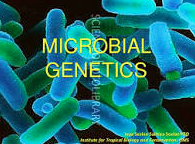MICROBIAL GENETICS Multiple Choice Questions :-
1. In the time since E. coli and Salmonella diverged evolutionarily
A. there has been little change in either genome
B. E. coli has acquired many genes via horizontal transfer
C. E, coli has lost approximately 50% of its genome
D. none of these
Answer: C
2. Which of the following theory is supported by the genomic sequence of the obligate intracellular parasite Rickettsia prowazekii ?
A. Parasitic bacteria have very large genomes
B. Parasites have a definite genomic sequence similar to viruses
C. Mitochondria have evolved from endosymbiotic bacteria
D. All bacteria evolved from viruses
Answer: C
3. The physical nature of genomes is studied under
A. structural genomics
B. comparative genomics
C. proteo genomics
D. functional genomics
Answer: A
4. The species of bacteria, which possesses 250 genes for lipid biosynthesis is
A. M. genitalium
B. M. tuberculosis
C. E. coli
D. H. influenzae
Answer: B
5. Why the bacterium Treponema pallidum is difficult to culture?
A. Because it requires a great deal of water to reproduce
B. Because it is unable to use carbohydrates as an energy source
C. Because it lacks the genes needed for TCA cycle and oxidative phosphorylation
D. Because it requires extremely low temperature at which water freezes
Answer: C
6. What is the range of minimum set of genes required for life?
A. 50-100 genes
B. 250-350 genes
C. 1000-1500 genes
D. 1500-2000 genes
Answer: B
7. The flow of genetic material in microbial cells usually takes place from
A. RNA through DNA to proteins
B. proteins through RNA to DNA
C. DNA through RNA to proteins
D. none of these
Answer: C
8. Which of the following is used for determining the location of specific genes within the genome?
A. Genomics B. Annotation
C. Cloning D. Proteomics
Answer: B
9. Proteomics is
A. the study of algal genomes
B. a branch of quantum physics dealing with proteins
C. the study of formation of lipo-protein in animals
D. the study of the entire collection of proteins expressed by an organism
Answer: D
10. Which of the following is concerned with the management and analysis of biological data using computers?
A. Bio-physics
B. Bioinformatics
C. Genomics
D. Biomechanics
Answer: B

MICROBIAL GENETICS Objective type Questions with Answers
11. Which type of genomics studies the transcripts and proteins expressed by a genome?
A. Comparative genomics
B. Structural genomics
C. Proteo genomics
D. Functional genomics
Answer: D
12. Which of the following is the study of the molecular organization of genomes, their information content and the gene products they encode?
A. Genetics B. Ergonomics
C. Genomics D. Bioinformatics
Answer: C
14. Which of the following organisms has the smallest genome?
A. H. influenzae
B. M. genitalium
C. M. tuberculosis
D. None of these
Answer: B
15. Studies of similarities and differences among the genomes of multiple organisms is carried out in
A. comparative genomics
B. proteomics
C. functional genomics
D. structural genomics
Answer: A
16. Why Deinococcus radiodurans is able to survive massive exposure to radiation?
A. Because it produces a thick shell which acts as a shield from the radiation
B. Because it has unique DNA repair mechanisms
C. Because its cellwall contains radioactive elements
D. Because it has many copies of genes encoding DNA repair
Answer: D